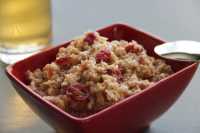25 Aug Instant Oatmeal at Breakfast Reduced Hunger and Food Intake At Lunch

MedicalResearch.com Interview with:
Candida Rebello, PhD candidate
Louisiana State University
Pennington Biomedical Research Center
School of Nutrition and Food Sciences
Baton Rouge , Louisiana
MedicalResearch: What is the background for this study? What are the main findings?
Response: Oats contain a soluble fiber called beta-glucan. When mixed with liquids, this fiber induces viscosity or what is commonly called thickening. The degree of thickening depends on a number of factors such as the structure and concentration of the fiber, its molecular weight, and the ease with which the fiber will absorb water. These qualities of the fiber can be affected by various processing techniques used in the preparation of food products. Viscosity affects appetite by influencing the way foods interact with the mouth, as well as the stomach and intestines. Viscosity in the stomach can cause distension and promote a feeling of fullness. Viscosity in the intestinal tract delays digestion and absorption allowing nutrients to interact with cells and release hormones that reduce hunger and keep a person full for a prolonged period after eating a meal which is termed satiety. Viscosity in the mouth also affects appetite and all these effects often work in concert. In animal studies, oat beta-glucan has been shown to influence appetite regulating hormones, as well as reduce food intake and body weight.1,2 In human trials, several studies have shown that oat beta-glucan reduces appetite.3-10 In this study, we found that instant oatmeal eaten at breakfast reduced hunger, increased fullness, and reduced food intake at lunch, compared to an oat-based ready-to-eat cereal containing equal calories. Instant oatmeal had greater viscosity than the ready-to-eat cereal.
 MedicalResearch: What should clinicians and patients take away from your report?
MedicalResearch: What should clinicians and patients take away from your report?
Response: While it remains to be established whether eating oatmeal every day will result in a loss of body weight in humans, its effects on suppressing hunger, increasing fullness, and reducing food intake are important. For most people, adhering to a diet regimen, and coping with ill-humor stemming from hunger pangs is difficult. This is especially so when individuals are placed on a diet, since weight loss induces hormonal changes as well as changes in brain chemistry that increase the impulse to eat. Foods that help individuals to cope with hunger and the desire to eat provide a strategy for successful weight management.
MedicalResearch: What recommendations do you have for future research as a result of this study?
Response: Since viscosity is important for the response in the body, more studies are needed to understand how variations in the source, processing treatments, and interactions with other components in food affect the fiber and the physiologic response. This will help in the development of products containing beta-glucan that can replace foods in the diet and keep consumers full for a prolonged period.
Citation:
J Am Coll Nutr. 2015 Aug 14:1-9. [Epub ahead of print]
References:
- Huang XF, Yu Y, Beck EJ, et al. Diet high in oat beta-glucan activates the gut-hypothalamic (PYY(3)(-)(3)(6)-NPY) axis and increases satiety in diet-induced obesity in mice. Mol Nutr Food Res. Jul 2011;55(7):1118-1121.
- Lin N, Li Y, Tang L, Shi J, Chen Y. In vivo effect of oat cereal beta-glucan on metabolic indexes and satiety-related hormones in diet-induced obesity C57-Bl mice. Mol Nutr Food Res. Jul 2013;57(7):1291-1294.
- Beck EJ, Tosh SM, Batterham MJ, Tapsell LC, Huang XF. Oat beta-glucan increases postprandial cholecystokinin levels, decreases insulin response and extends subjective satiety in overweight subjects. Mol Nutr Food Res. Oct 2009;53(10):1343-1351.
- Rebello CJ, Johnson WD, Martin CK, et al. Acute effect of oatmeal on subjective measures of appetite and satiety compared to a ready-to-eat breakfast cereal: a randomized crossover trial. J Am Coll Nutr. 2013;32(4):272-279.
- Rebello CJ, Chu YF, Johnson WD, et al. The role of meal viscosity and oat beta-glucan characteristics in human appetite control: a randomized crossover trial. Nutr J. 2014;13(1):49.
- Geliebter A, Nerys MA, Aviram-Friedman R, Yahav E, Hashim S. Skipping breakfast leads to weight loss but also elevated cholesterol compared with consuming daily breakfasts of oat porridge or frosted cornflakes in overweight individuals: a randomised controlled trial. J Nutr Sci 2014;3:e56 – 62.
- Geliebter A, Grillot CL, Aviram-Friedman R, Haq S, Yahav E, Hashim SA. Effects of oatmeal and corn flakes cereal breakfasts on satiety, gastric emptying, glucose, and appetite-related hormones. Ann Nutr Metab. 2015;66(2-3):93-103.
- Juvonen KR, Purhonen AK, Salmenkallio-Marttila M, et al. Viscosity of oat bran-enriched beverages influences gastrointestinal hormonal responses in healthy humans. J Nutr. Mar 2009;139(3):461-466.
- Pentikainen S, Karhunen L, Flander L, et al. Enrichment of biscuits and juice with oat beta-glucan enhances postprandial satiety. Appetite. Apr 2014;75:150-156.
- Lyly M, Ohls N, Lahteenmaki L, et al. The effect of fibre amount, energy level and viscosity of beverages containing oat fibre supplement on perceived satiety. Food Nutr Res. 2010;54.
Candida Rebello, PhD candidate (2015). Instant Oatmeal at Breakfast Reduced Hunger and Food Intake At Lunch
Last Updated on August 25, 2015 by Marie Benz MD FAAD
